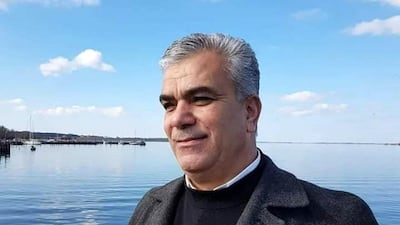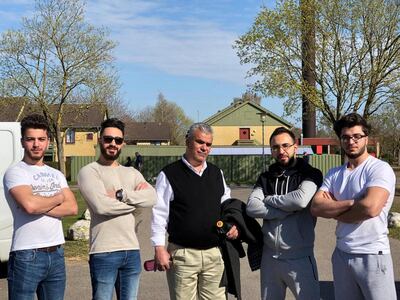Akram Bathish's death this month in exile from his native Syria in Denmark was a family tragedy which plunged his family into wholesale uncertainty about their future.
Like 94 other Syrians who have recently had their residencies in Denmark stripped, Mr Bathish had received a letter from the Danish Immigration Services that said he was to be deported to the Syrian capital Damascus. He worried he might never see his wife or children again and subsequently spent sleepless nights, hours on the computer researching and more with a lawyer to try and appeal the decision.
Just weeks after the letter arrived Mr Bathish died of a heart attack at the age of 61, pitching the rest of the family into a legal limbo.
The letter had terrified everyone in the family, Mr Bathish's son, Ziad, tells The National from Denmark, and he believes the stress his father felt at the prospect of being sent back to the Assad regime-controlled country contributed to his poor health.
Like millions of Syrians who have endured the brutal war, Mr Bathish had reason to be scared. He had been imprisoned in 2012 by the country’s security forces for opposing the regime’s heavy-handed response to protests at the time.
He continued to be watched by the intelligence services after his release and by 2014 the situation on the ground was only becoming more violent and uncompromising.
That is when Mr Bathish decided to leave Syria with his son Ziad for Algeria, where his other son, Anas, had been living for two years. Reunited, they continued their journey onwards through the Algerian desert to Tunisia and into Libya, crossing yet another expanse of sand.
"It was a very difficult and risky journey because of dealing with human traffickers who only care about money. But we were strong together. From Libya we went in a very old and small boat to Italy; the greatest danger was the presence of about 200 passengers on a worn out boat that could only accommodate 30 or 40 passengers," Ziad tells The National.
After getting lost at sea and being rescued by the Italian coastguard and brought to shore, the three men continued onwards.
“We decided to go to Denmark because we heard it was a good country to live in peace and have a good future but unfortunately it was not,” says the software engineering student.
Ziad is referring to an increase in anti-immigration policies and xenophobic attitudes in the country he was becoming used to calling home. This month, after determining that Syria was safe enough for refugees to return to – the only European country yet to do so - the Danish government stripped 94 Syrian refugees of their residency status in preparation for deporting them back to the war-torn country.
The move was denounced as cruel by many, but the policy is in line with its goal of "zero asylum seekers".
The UN does not consider Syria a safe country for refugees to return to for several reasons, including the poor security situation and a proclivity of the regime to "disappear" returnees and anyone suspected of being anti-government.
Just last month the UN Secretary General Antonio Guterres denounced the Syrian government's widespread detention, torture and use of chemical weapons, calling them the 'greatest crimes the world has witnessed this century.'
Danish officials insist their policy is in line with the level of protection needed.
"We have made it clear to the Syrian refugees that their residence permit is temporary," Denmark's Immigration Minister, Mattias Tesfaye, told The Telegraph this year.
Despite declaring Damascus safe, however, Denmark cannot forcibly return refugees to Syria. Instead, the government is offering thousands of euros to Syrians to return "voluntarily" or face being placed in a deportation centre. “Denmark can't send people immediately to Syria on their own responsibility, but they send people to refugee camps, which are like prisons because there is no future, no life, or anything there,” explains Ziad, whose father was offered the option of a "voluntary return" and refused.
Mr Bathish's case is not unique and social media is awash with testimonies of Syrians in Denmark anxious about their status and future. There are 1,250 Syrians in the Scandinavian country and Denmark is reviewing hundreds of other refugee statuses, particularly those from Damascus, where active fighting has ceased but where the threat of imprisonment, kidnap or murder remains high.
Danish government says it's safe for Syrian refugees to return, but Syrians are fighting back
Denmark decides Syria is safe for refugees to return
Syrian atrocities are ‘greatest crimes’ this century, UN chief says




